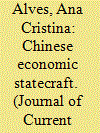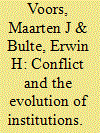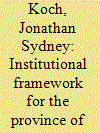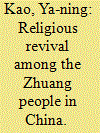| Srl | Item |
| 1 |
ID:
120108


|
|
|
|
|
| Publication |
2013.
|
| Summary/Abstract |
Africa's and South America's rich endowments of resources and great need for infrastructure development make them perfect candidates for China's "infrastructure-for-resources" loans. Over the past decade, such an arrangement for pursuing China's resource-security goals overseas - namely, securing long-term supply contracts and accessing exploration rights - has proved more effective in Africa than in South America. This article discusses the reasons for this regional variation by providing a comparative study of China's economic statecraft in Angola and Brazil, focusing on the deployment of infrastructure-for-oil deals. It argues that the variation in China's energy-security outcomes (long-term supply and access to oil equity) in Angola and Brazil can be attributed mostly to fundamental differences between the institutional structures of each country's oil industry. Although this foreign policy instrument has worked well for the centralised structure encountered in Angola, it has been less suitable for the far more liberalised and regulated environment that characterises Brazil's oil sector.
|
|
|
|
|
|
|
|
|
|
|
|
|
|
|
|
| 2 |
ID:
133702


|
|
|
|
|
| Publication |
2014.
|
| Summary/Abstract |
The impact of armed conflict may persist long after the end of war, and may include a lasting institutional legacy. We use a novel dataset from rural Burundi to examine the impact of local exposure to conflict on institutional quality, and try to 'unbundle' institutions by distinguishing between three dimensions of the institutional framework: property rights security, local political institutions, and social capital. We find that conflict exposure affects institutional quality, and document that the impact of conflict on institutional quality may be positive or negative, depending on the institutional measure. Specifically, exposure to violence strengthens in-group social capital and promotes tenure security. However, the appreciation for state institutions is negatively affected by exposure to violence. We find no evidence consistent with design-based theories of institutional quality, or the idea that institutional quality is enhanced by interventions of (non)state external actors. Instead our findings provide some support for the theory of parochial altruism. Our results emphasize the importance for policymakers to consider autonomous responses to conflict when designing development programs. They further imply some caution for actors seeking to reform local institutions through top-down interventions.
|
|
|
|
|
|
|
|
|
|
|
|
|
|
|
|
| 3 |
ID:
158351


|
|
|
|
|
| Summary/Abstract |
This article addresses the current lack of a legal framework for the use of space resources found on asteroids and other celestial bodies. In a world of growing inequality and in face of the increasing commercialization of space, governance structures are needed to ensure that the benefits of the “province of all mankind” are not solely reaped by those industrialized nations that have the technological and financial capabilities. Drawing upon the practical achievements of the International Seabed Authority governing the extraction of natural resources from the seabed in areas beyond national jurisdiction, a discursive policy framework for the equitable development of the global commons of space is proposed. Acknowledging the importance of a multi-disciplinary approach, the normative structure is complemented by the insight gained from stakeholders from across sectors, in a critical effort to unite political, ethical, and commercial considerations.
|
|
|
|
|
|
|
|
|
|
|
|
|
|
|
|
| 4 |
ID:
132733


|
|
|
|
|
| Publication |
2014.
|
| Summary/Abstract |
This paper examines two cases of Zhuang religious revival involving multiple actors. It shows how consideration of "superstition" (??, mixin) places some religious practice outside the institutional framework when discussing the modern concept of religion in China. In this paper, I particularly focus on two main dimensions of religious revival among the Zhuang people. The first is a grassroots dimension that involves the revival of a so-called "superstitious" cult in which Zhuang people along the Sino-Vietnamese border carry out shamanic rituals to make offerings to a powerful chief-turned-deity, Nong Zhigao, and his wife. The second dimension is a top-down dynamic and involves a series of projects conducted by Zhuang officials, scholars and business persons, which aim to standardize a Zhuang religion, known as Mo religion. These two cases of religious revival demonstrate the varied strategies utilized by different actors in response to government policies regarding religion in China.
|
|
|
|
|
|
|
|
|
|
|
|
|
|
|
|